China Travel Journal: Central Yunnan
| This travel journal is part of a series of journals, which are all written during a long trip between november 2007 and may 2009. |
> Flying to China
09-04-2008 When reconfirming our flight tickets Vientiane-Kunming two days ago we were told to make sure we're at the airport at 5 to check in on our flight at 6.30 o'clock. Yeah, that's right: 5 A.M.! It cost us quite some effort last night and a little more than the usual charge to persuade a tuktuk driver to take us to the airport, but he's right on time, at 4.15 a.m. Through dark, empty streets we're heading to the airport in no more then 10 minutes. The experienced reckoner (and the less experienced one as well) now knows we're a bit early, standing at the gate before four thirty, being the first customers of the day. Some people told us Lao Airlines overbooks its flights on a regular basis and with our own experience with Delta Airlines still fresh in our minds we don't want to take any risk. We wanna be sure of our seats, after all we've been waiting 8 extra months to finally get to China. That we have to wait thirty more minutes at this bizarre hour we take for granted.
When entering the fairly new and modern departure hall we spot a completely out of place, old sign, where handwritten flight numbers and departure times are posted. Still from the time of the last departure hall, replaced over 10 years ago?
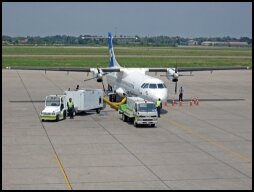 Our flight is also among the numbers, showing a quite interesting departure time: 1.30 pm. Could it be that our flight has been delayed, is this sign perhaps no longer in use or did they make a mistake? There's nobody here to ask questions to, there's just a security man walking around, who doesn't speak English. When the counters open at 5 we're compassionately being stared at: "Kunming...?!?" Uhm... yes? Whether we didn't hear the news. Of the delay. Now our flight will not depart before 1.30 pm. Hmm, so no mistake after all. Naturally there's not a single tuktuk driver around at this hour and our own guy has left thirty minutes ago. An expensive taxi is called for us, but probably the driver feels sorry for us, as he suggests to take us back to our guesthouse for a small price, to pick us up again in the early afternoon. Or maybe he's so cheap because he barely sees anything and never even got his driver's license. Only 20 meters from the fence he abruptly slams hits the brakes and asks startled whether the fence is open. Well, that's a safe feeling!
Our flight is also among the numbers, showing a quite interesting departure time: 1.30 pm. Could it be that our flight has been delayed, is this sign perhaps no longer in use or did they make a mistake? There's nobody here to ask questions to, there's just a security man walking around, who doesn't speak English. When the counters open at 5 we're compassionately being stared at: "Kunming...?!?" Uhm... yes? Whether we didn't hear the news. Of the delay. Now our flight will not depart before 1.30 pm. Hmm, so no mistake after all. Naturally there's not a single tuktuk driver around at this hour and our own guy has left thirty minutes ago. An expensive taxi is called for us, but probably the driver feels sorry for us, as he suggests to take us back to our guesthouse for a small price, to pick us up again in the early afternoon. Or maybe he's so cheap because he barely sees anything and never even got his driver's license. Only 20 meters from the fence he abruptly slams hits the brakes and asks startled whether the fence is open. Well, that's a safe feeling!A bit later we get back into our bed, which is still almost warm and not yet cleaned, so still available. When we return to the airport some hours later it's much more busy than this early morning. Despite the bustle we encounter the same Chinese man, who also hadn't been told about the delay and who was at the same counter with us this morning. We get into a conversation and he suggests some places we should visit in China. One of those suggestions is, to our great surprise, Tibet. For a moment we think we've met the first Chinese guy ever with a sense of humor, but Yvonne warily puts forward that it would probably not be possible to visit Tibet at the moment. This man however is deadly serious and he explains in sights and sounds that one could get to Lhasa by flying from Chengdu. We're speechless; would this person dressed in a red sweater, shortly called our "red comrad", truely have no idea of what happens in Tibet and the rest of the world right now? Does he really think China lets us even NEAR Tibet right now? Well, let's not destroy the bubble and wisely keep quiet. Besides you can't be too cautious on this subject. Perhaps it's a spy of Maos successors, who has the task to find reasons to forbid us to enter the country. As said before we finally want to get to China now, so we can't take the risk.
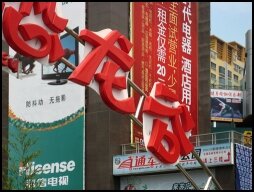 At exactly 1.30 pm the time has come and we take off in a propellor aircraft for the very first time. We bounce and shake a little and before we even know we see the mountains and rice terraces of Yunnan getting bigger and bigger. Next thing is all the green makes way for giant concrete monsters, huge residential areas with the same flats everywhere: Kunming's outskirts.
At exactly 1.30 pm the time has come and we take off in a propellor aircraft for the very first time. We bounce and shake a little and before we even know we see the mountains and rice terraces of Yunnan getting bigger and bigger. Next thing is all the green makes way for giant concrete monsters, huge residential areas with the same flats everywhere: Kunming's outskirts.Large Chinese characters everywhere; neon signs; everything, anything for sale. No ramshackle, handmade foodstalls with homecooked, selfmade food, but decent restaurants of all sorts one could wish for. No dirty, loud tuktuks driven by men who constantly yell to us white people, whether they need a ride, but quiet, odor-free electric scooters, even for the police. No plastics and other rubish as far as you can see, but neat foodpaths, without loose paving slabs and obstacles. No music from too large speakers and in season and out of season yelling in a microphone, but an organized bustle of neatly dressed Chinese. No noise from out of our hotel room, or reasonance of other geusts in the hallways, but deafening silence... unnatural and truely scary! Thick carpeting and curtains which are wide ánd long enough. No incessantly whining of Lao or Thai music. Unimaginable how one can adjust to the South East Asian, constant mistreatment of your sences in only a few months, and how different is China. We have to settle down a bit.
> Kunming
10-04-2008 Through the surprisingly clean Kunming we cycle around to find the Porsche Centre, to get us a picture of Treelo with a 911. Distances are large and on our tiny bicycles we don't make a lot of progress, but it's for an important income of our charity and so we keep on going. We're surprised to see many signs in English, even many traffic signs are provided with some English texts. In the outskirts the English signs get more scarce to disappear completely after a while. Using some
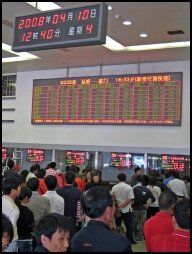 hands-and-feet-inquiries we get there after all and by the end of the morning we can tick one more succeeded assignment off the list.
hands-and-feet-inquiries we get there after all and by the end of the morning we can tick one more succeeded assignment off the list.At the overcrowded station, accommodated with all the timetables and counter numbers, but all just in Chinese, we play another game of "hints". Wij win, as we leave soon, wíth train tickets to our next destination Dali. Once we found out which counter to go to, ours happened to be the one without a line with at least 30 Chinese. Apparently no one wants to visit Dali.
We spend the rest of the day finding two new lenses for our photocamera. We're still not 100 percent satisfied about our own, so we've decided to get two better ones, with a smaller range, complementing each other. This mission eventuelly succeeds as well and we find a visit to Kentucky Fried Chicken an appropriate reward.
Kunming turned out to be a true shopping paradise, where we had the choice of as many as 6 camera stores in the same street and where expensive
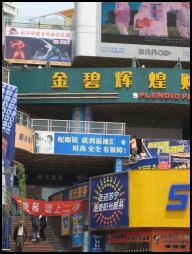 clothes and make-up are sold like hote cakes in the many lucurious department stores. In the center is great interest in the fashion show of extremely chic wedding clothes and every minute there's another shiny car of highly above average value passing by, most of them in black colour. When this is communism, where all is shared fairly and where there's work for all, why is there a women who hasn't washed for months, with large tangles in her hair crying out loud, laying on the steps of an expensive shop? And why is there a father without arms begging in the gutter, accompanied by his three year old daughter, while Chanel dresses and Levis jeans pass him. China is doing well, as we can see and we definately don't begrudge them, especially after an era of great poverty. However, it would be nice when everyone could benefit, or there would be at least help for those who need it.
clothes and make-up are sold like hote cakes in the many lucurious department stores. In the center is great interest in the fashion show of extremely chic wedding clothes and every minute there's another shiny car of highly above average value passing by, most of them in black colour. When this is communism, where all is shared fairly and where there's work for all, why is there a women who hasn't washed for months, with large tangles in her hair crying out loud, laying on the steps of an expensive shop? And why is there a father without arms begging in the gutter, accompanied by his three year old daughter, while Chanel dresses and Levis jeans pass him. China is doing well, as we can see and we definately don't begrudge them, especially after an era of great poverty. However, it would be nice when everyone could benefit, or there would be at least help for those who need it.
> The Stone Forest
11-04-2008 We've come to a phase in which you're allowed to go to the store for some shopping all alone, carrying the note your mother made and which you'll have to hand over to the lady at the couter. A note like that, saying "Shilin Stone Forest", but in Chinese characters, we hand over at the station and we're directed to the right bus. The tickets are bought for us at one of the counters and brought to us. What a service, isn't it?!
In the middle of the morning traffic jam we leave Kunming a bit later, to follow the brand new highway to Shilin.
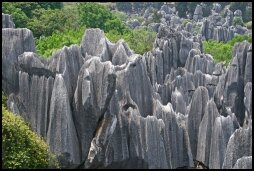 Ninety minutes later we see the first interesting rock formations and after fifteen more minutes we're at a huge parking lot, amidst touringcars full of Chinese. As soon as we've left the souvenir- and foodfair behind and paid the steep entrance fee of EUR 12,50 per person, we're able to check out this Unesco World Heritage with our own eyes. Giant, jagged rock formations are gathering on a short distance from each other and while walking in between them we feel tiny. It's a whole new expercience after moving around like giants among the Asian people.
Ninety minutes later we see the first interesting rock formations and after fifteen more minutes we're at a huge parking lot, amidst touringcars full of Chinese. As soon as we've left the souvenir- and foodfair behind and paid the steep entrance fee of EUR 12,50 per person, we're able to check out this Unesco World Heritage with our own eyes. Giant, jagged rock formations are gathering on a short distance from each other and while walking in between them we feel tiny. It's a whole new expercience after moving around like giants among the Asian people.We barely see any foreigners, but so much the more Chinese in large groups, babbling loud, while following a chief-Chinese who's carrying a colourful flag. Still there are enough corners and alleys where we feel all alone with the giant rocks. The tours all do the same route, which mostly follows the pavilions and souvenir stalls.
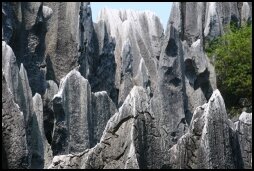 We have plenty of possibilities to try our new lenses and to check out all parts of the park. Everything looks neatly arranged by the way, sometimes even a bit too much.
We have plenty of possibilities to try our new lenses and to check out all parts of the park. Everything looks neatly arranged by the way, sometimes even a bit too much.A few hours later we've seen enough, as... well, it's still just rocks of course. In ninety minutes we hop on the bus back to Kunming and we get to know the Chinese way of life more and more. Staring is no problem, as you're curious about those white foreigners with their long noses, who you normally never get to see of course. What are they grabbing from their bags now, what do they take a picture of and what do they eat? You don't secretly check it out, but watch in public and extensively, while you gurgle and rattle as loud as possible in the meantime, but you do aim your spit neatly into a garbage bin. Still we think they're adorable, they are kind and helpful and enjoy laughing. We're feeling at home!
12-04-2008 We enjoy another day in Kunming, shopping city pur-sang and a culture shock on its own, after Cambodia and Laos. A matching filter for our lenses is found soon enough and a new shirt for Peter gets in our bag as well. Yvonne visits a hairdresser for the first time in three months, but the Chinese lady barely knows any English, resulting in a very Chinese hairdo, way too short on the front. While we discuss the magnitude of the disaster the lady bursts into tears after a repeatedly "o solly, I am zo solly". Well, it's not THAT bad lady, it will grow back in a while.
We make a wanderer happy with an old shirt from Peter and to chear us up after the bad hairdo we buy a new pair of trousers for Yvonne. One of her jeans almost fell apart anyway, but when you don't have a lot of things you get attached to everything and it's hard to say goodbye.
> On our way to Dali
13-04-2008 On time and extensively looked at by loads of Chinese, we sit down in the waiting hall to wait for train N808 to Dali.
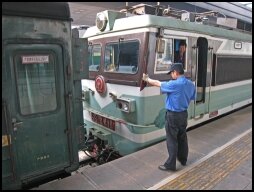 Every train has its own waiting line and thirty minutes before departure there's a train entering and the fences to the platform open. For each wagon a spick and span employee's waiting to check the tickets, and each ticket says which seat's yours, in Chinese however. But, as said before, people are very helpful and soon we're seated. How well organized is all of this and how calm it all works to get 800 people in a train.
Every train has its own waiting line and thirty minutes before departure there's a train entering and the fences to the platform open. For each wagon a spick and span employee's waiting to check the tickets, and each ticket says which seat's yours, in Chinese however. But, as said before, people are very helpful and soon we're seated. How well organized is all of this and how calm it all works to get 800 people in a train.From the train we get an opportunity to take a close look at the beautiful hilly province of Yunnan. We see nice, little villages with
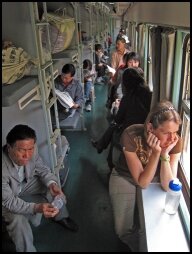 clay houses and many typical Chinese rooftops, golden fields of grain, green bushy hills and modern cities. It's surprising how easy the train runs through the mountainous area, passing kilometer long tunnels and high bridges. Italy and Austria are nowhere compared to this.
clay houses and many typical Chinese rooftops, golden fields of grain, green bushy hills and modern cities. It's surprising how easy the train runs through the mountainous area, passing kilometer long tunnels and high bridges. Italy and Austria are nowhere compared to this.After eight hours of sitting on a hard bench we're pretty lame when disembarking and we're trying to find bus number 4 straight away. This bus should, according to our travel guide, take us to Dalis old city in thirty minutes. However, we don't find a bus number 4 and no one seems to understand where we're headed to. Then the conductor from our train sees us and he puts 2 fingers in the air: thumb and index finger. You'd expect we're sent to line 2, but in China everything's different and even something simple like pointing out numbers using your fingers is not as easy as it seems here. Thumb and index finger up happens to be 8 here!
Randomly we enter the center of ancient Dali and soon we find a guesthouse which looks nice. The new building is very cosily built in old-Chinese style, square-shaped around a courtyard and the room we're offered is the most luxurious one we've seen in the past 5 months. And costing just EUR 5,50 a day; this is our place.
14-04-2008 Dali is a nice place and our little hotel turns out to be just outside the tourist center, nice and quiet. As we open our curtains we see local people in costumes, carrying large baskets on their backs, going to the market, through the narrow cobblestone alleys. Almost all the houses have those funny red lanterns hanging at the door and from inside we hear the sounds of Chinese music.
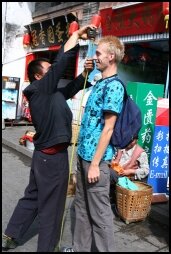 On our way to the real center we see more and more people walking to the market for shopping. One man is so much surprised by Peter's length he abruptly pulls a tape-measure from his pocket to measure Peter. A whole 1.90 m!! Yes, we knew that of course. There are barely any other tourists, probably it's not the right season. We stroll around at the market with its many colourful ladies, who mainly sell vegetables, and next we're lucky with a really successful acquisition in a bookshop: an English-Mandarin phrasebook and dictionary. We've frequently felt awkward in this country, where English is barely spoken. Soon we're able to have a few words with some curious men who, friendly as they are, offer Peter a sigaret.
On our way to the real center we see more and more people walking to the market for shopping. One man is so much surprised by Peter's length he abruptly pulls a tape-measure from his pocket to measure Peter. A whole 1.90 m!! Yes, we knew that of course. There are barely any other tourists, probably it's not the right season. We stroll around at the market with its many colourful ladies, who mainly sell vegetables, and next we're lucky with a really successful acquisition in a bookshop: an English-Mandarin phrasebook and dictionary. We've frequently felt awkward in this country, where English is barely spoken. Soon we're able to have a few words with some curious men who, friendly as they are, offer Peter a sigaret.
We look around in this town with its authentic houses and the beautiful gates in the city wall. On our way to the three pagodas it suddenly starts to rain and we take shelter in our relaxing room for the rain. Fortunately the weather gets better an hour or so later.
> Around the Er Hai Lake
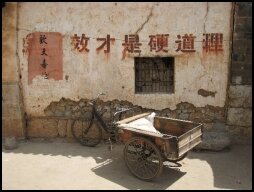 15-04-2008 As soon as we finished a lovely breakfast, with some real brown bread, we get in the car we rented for ourselves for the day. In China we're not allowed to drive ourselves, so a driver comes with the car. Unfortunately it takes a while before this man understands that we're not here to see tourist attractions like the colourful cable car to the colourfully lit cave in the mountain and the replica Bai house, but are much more interested in the real Bai houses, where the paint is fading and the pigs potter about the courtyards. It will probably have something to do with the fact that he gets a nice commission at all of those star attractions with their already ridiculously steep entrance fees. According to him there's no local market in the first village, called Xizhou, so we follow the women carrying bulging baskets in a reverse direction to find the market ourselves. We see lots of large, decorated straw hats our queen would definately envy and many people wearing colourful costumes, while the products vary from ginger and anise to living chicken and fish.
15-04-2008 As soon as we finished a lovely breakfast, with some real brown bread, we get in the car we rented for ourselves for the day. In China we're not allowed to drive ourselves, so a driver comes with the car. Unfortunately it takes a while before this man understands that we're not here to see tourist attractions like the colourful cable car to the colourfully lit cave in the mountain and the replica Bai house, but are much more interested in the real Bai houses, where the paint is fading and the pigs potter about the courtyards. It will probably have something to do with the fact that he gets a nice commission at all of those star attractions with their already ridiculously steep entrance fees. According to him there's no local market in the first village, called Xizhou, so we follow the women carrying bulging baskets in a reverse direction to find the market ourselves. We see lots of large, decorated straw hats our queen would definately envy and many people wearing colourful costumes, while the products vary from ginger and anise to living chicken and fish.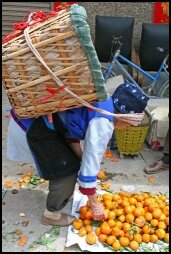 In Shuanglang, a village on the other side of the lake, we're just peeking curiously through the gate of one of the houses built in a square around a courtyard, as the female owner comes back home. We're invited inside and are shown the family portraits of the housewife. Meanwhile grandpa's staring at Peters blue eyes. When the photos are all admired it's time to go, as it's impossible to have any kind of conversation whatsoever, even wíth our Chinese phrase book.
In Shuanglang, a village on the other side of the lake, we're just peeking curiously through the gate of one of the houses built in a square around a courtyard, as the female owner comes back home. We're invited inside and are shown the family portraits of the housewife. Meanwhile grandpa's staring at Peters blue eyes. When the photos are all admired it's time to go, as it's impossible to have any kind of conversation whatsoever, even wíth our Chinese phrase book.In Wase, the next village we visit, we're lucky. It seems like there's an anual market (or something like that) going on, fo which everybody's dressed in their best costumes and the entire area seems present. It's time to have teeth pulled or to purchase a new denture in the streets or to go for a new haircut.
In the whole area people are busy harvesting some kind of beans. The harvest is spread out on the street and while cars and horse cars run them over hardworking people are separating the wheat from the chaff, others are threshing or do other oldfashioned things of which we have no idea, but it all looks nice. In Haidong, which means "East of the
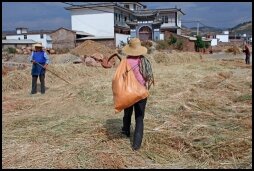 Lake", we get out of the car to check it all out from up close. We now understand why we have machines to do this in the Netherlands: hmpfff that's a hell of a lot of work!
Lake", we get out of the car to check it all out from up close. We now understand why we have machines to do this in the Netherlands: hmpfff that's a hell of a lot of work!The last part of the road, to circle the lake, has been closed and so we're sent over some kind of mule track through the mountains. Here we see horse cars, but even people pulling their own carts full of straw or grain, and some truely simple clay huts. Thirty minutes of bouncing and bumping later we return to the paved road and soon we're back in Dali.
16-04-2008 We have a good sleep, enjoy breakfast and then Yvonne thinks it's time to have some first aid done on the hair. It seems like European hairdressing is rather difficult and even though both of us try our best to point out every single tuft that needs to be cut the girl says "yes", while she does "no". Eventually Peter takes over her scissors to limit the damage a bit and it's a good thing we only see the Chinese version of : "I should never have let you near me!" in our phrase book hours later.
The rest of the day passes while we enjoy the view of the mountains, the bustle around the market and the relative quietness at the village square and we relax a bit.
Kunming neon signs filmThe Kunming neon signs film will show here |
Click on the film up here to take a look at the horrible neon signs of Kunming, almost live.
> More Info
Also check our China info page, where you can find a lot of information about China and come see our Central Yunnan photos.